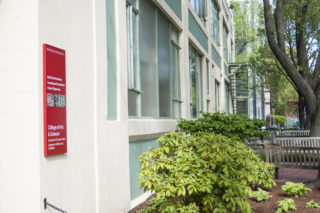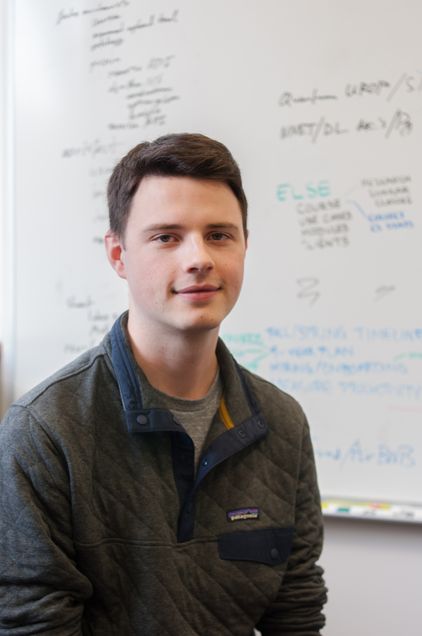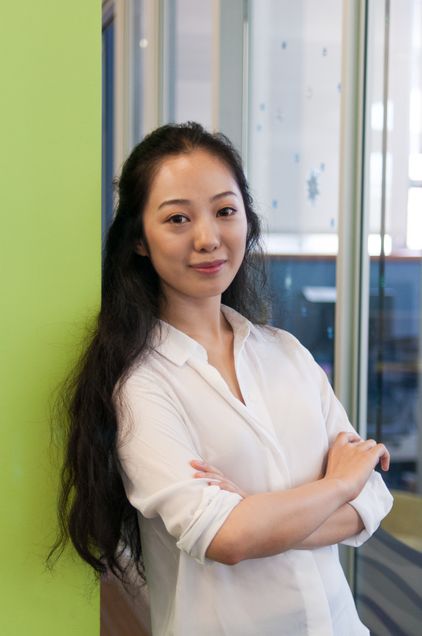Meet the SAIL Interns
[Return to Nexus Newsletter]
By Yanshu Li
If you enter the Hariri Institute for Computing at 111 Cummington Mall, a slightly low-profile street on the east campus of Boston University, quite frequently you will find a group of young people exchanging ideas and discussing the progress of their projects on a 72-inch screen in a conference room with glass walls. They are the software engineers and the interns at SAIL, BU’s Software & Application Innovation Lab.
quite frequently you will find a group of young people exchanging ideas and discussing the progress of their projects on a 72-inch screen in a conference room with glass walls. They are the software engineers and the interns at SAIL, BU’s Software & Application Innovation Lab.
SAIL is a unique, collaborative resource housed within the Hariri Institute. Launched in 2014, SAIL provides researchers with professional software development capacity in support of computational and data-driven projects that require cutting-edge solutions. The lab initiated a student internship program in the summer of 2016 to provide BU students with unique experiential learning opportunities.
Meet the spring 2017 SAIL interns:
Ben Getchell (CGS ’09, CAS ’11, GRS ’17)
Ben Getchell (CGS ’09, CAS ’11, GRS ’17) was one of the first participants in the internship program.
Getchell completed his undergraduate students at BU with a major in philosophy and minor in math; then he returned for a graduate degree in computer science. After meeting with SAIL’s Director Andrei Lapets and Senior Software Engineer Frederick Jansen, Getchell became fascinated with the Views of Education Across Nations project, which was using natural language processing to validate the thesis of Cathie Jo Martin, professor of political science at the College of Arts & Sciences, regarding the outcomes of varying models of education reform.
“The whole job is coding, and you get exposed to different flavors of software engineering,” says Getchell.
He has also worked on the Multi-Party Computation for 100% Talent project, developing a web application to support a secure data analysis process for over 60 of the largest employers in Boston.
“That’s fun!” says Getchell. “I like working with crypto and network securities. And you have the opportunity to work on the projects that are in line with your interests.”
Getchell credits the diverse projects at SAIL with having broadened his horizon and guiding him to a variety of practical career options. “I was interested in computer science by modeling video games since I was a kid,” says Getchell. “Also, computer science provides a more viable career than philosophy.”
With enthusiasm for the humanities, math and computer science, Getchell hopes to land in the research field of physical science following his recent graduation.
Raphael Baysa (CAS ’17)
During his time as a SAIL intern, Raphael Baysa worked on the Amicus Curiae Briefs project. Led by Dino Christenson, Associate Professor of Political Science (CAS), the project is building a web application to present data about amicus curiae briefs that have been filed over the past century. Baysa and Jansen, the staff advisor on the project, developed lean tools and packages that allow for web-based queries of a network of briefs.
“The thing I like about web applications and making things from a scratch is that there are many ways to do it,” says Baysa. “So finding the best way means considering what the client wants.”
SAIL provides an environment where Baysa experienced what it’s like to be a professional software developer by working with a team engineers, meeting weekly for updates, and discussing how to distribute work. “This is definitely something that exposes me to what I am going to be doing in the real world,” says Baysa.
Raphael Baysa met Lapets while he was taking Lapets’ Combinatoric Structures (CS 131) course. When the internship program launched, Baysa jumped at the opportunity to apply.
 “As students, I feel like there are not a lot of opportunities to develop software engineer skills,” said Baysa. “This is one thing I really appreciate about SAIL.”
“As students, I feel like there are not a lot of opportunities to develop software engineer skills,” said Baysa. “This is one thing I really appreciate about SAIL.”
With a highlighted, taper fade hairstyle, Baysa is a self-described creature of routine who’s looking forward to the 9 to 5 life. “I feel like I am not a ‘class’ kind of guy,” said Baysa. “I like hands-on things, rather than sitting in lectures and reading. I want to go straight to full-time work after I graduate.”
Rudhra Raveendran (CAS ’20)
Rudhra Raveendran likes to build things.
Raveendran has experienced the power of coding since he was in high school. As a computer science major whose favorite subject has never been math, the most enjoyable part of Raveendran’s work at BU is participating projects that let him bring his imagination to life.
“For computer science, at least the practical aspect of it, you can make things really easily. And it’s really fun to be able to see your creations come to life,” says Raveendran. “It has always been a creative outlet for me.
Since joining SAIL in spring 2017, Raveendran has been working on the Spinal Cord Injury – Functional Index (SCI-FI) project, a web survey platform that spinal cord injury patients can be taken remotely to gauge their healing progress.
“I found it’s a really interesting project because it’s my first time working on something that is medically-related. Most of my projects have always been making websites and games, and this feels like it has a lot more significance behind it. So, it’s fun to work on.”
Aiming to join a company such as Google or Microsoft as a software developer after graduation, Raveendran credits SAIL with providing key career development opportunities.
“At least the first few years right after college, I want to be making things,” says Raveendran. “After that, hopefully, I will be able to start my own thing.”
Ryan Walsh (CAS ’17)
Another SAIL software engineer intern who has contributed to the SCI-FI project is Ryan Walsh, a computer science major who graduated this past May.
Walsh participated in both backend and frontend development and had to adapt quickly in order learn new things during each component of the project. Working with Shreya Pandit, a SAIL software engineer, and the rest of the team, Walsh was impressed by the open and nurturing environment at SAIL. He especially appreciated the transparency between interns and staff and the interactions between different projects.
 “Here, you really know what everyone is working on. Even if you never touched that project, you’ll have an idea of what is going on,” says Walsh.
“Here, you really know what everyone is working on. Even if you never touched that project, you’ll have an idea of what is going on,” says Walsh.
Walsh is planning to relax over the summer and then find a well-established start-up company to work with fellow software developers who are excited about innovative projects.
For incoming freshmen who are interested in computer science, Walsh advises, “you have to have a natural ‘like’ for this. You definitely can’t do it if you are not enjoying it.”
“Don’t freak out if it’s really hard. It gets easier, you learn to enjoy it, you get to do really cool stuff. So just hang in there,” says Walsh.
Jacqueline You (CAS ’16, MED ’20)
When Jacqueline You volunteered at the Inpatient Unit of Beth Israel Hospital during high school, she realized how much she enjoyed being helpful to patients. “Giving out blankets, providing people with books and magazines, getting them things to make them comfortable, and also just having a conversation with patients,” are what You recalls most fondly about her experience. “While doing that, I discovered I really enjoyed interacting with patients and seeing them light up.” During her experience as part of a caring and warm medical team, she developed a new goal for herself: to become part of such a team.
Nevertheless, during her freshman year at BU, medical school was still an abstract idea. Instead, You majored computer science because of one visual basic programming class in high school that she thought was “enjoyable.”
You, one of the first SAIL interns, is now involved in two projects: GUN-CULTURE and the Mobile and Electronic Health ARC project.  SAIL has provided You an eye-opening view of research both at a medical center as well as at a large university.
SAIL has provided You an eye-opening view of research both at a medical center as well as at a large university.
“I think that given that I am interested in academic medicine, knowing how to talk the technology talk, as well as talk to researchers, is going to be a valuable skill going forward,” she says.
After graduating with her bachelor’s degree in computer science in 2016, You decided it was time to pursue her interest in medicine. Now an MD Candidate at BU’s School of Medicine, she is confident and clear about her unique path.
“Medicine does require people who think outside the box, and who bring different approaches to the table. One of [those] is the technological approach,” says You. “I think computer science is a great strength to have as a medical student.”
Sreeja Keesara (CAS ’19)
There are two things Sreeja Keesara likes most about being a SAIL software engineer intern: the learning curve and the flexibility.
Working with an archaeology Ph.D. candidate on one of SAIL’s projects, Keesara needed to learn how to program on a Windows machine, something she had never done before. Motivated by the database aspect of the project, Keesara installed a virtual machine to run Windows programs on her Mac and worked through that to learn all the new commands.
Balancing between internships and coursework, Keesara is appreciative of the freedom that SAIL affords her to manage her own time. “If I get my work done, I can learn a lot on my own terms, and I can still manage my classes, homework and everything else,” she said. “I definitely have a lot of independence.”
Both of Keesara’s parents are software engineers. But she wasn’t bitten by the software bug until she took CS 111 Programming in Python. “I really loved it, I really loved the professor,” said Keesara. “Then, I just stuck with it.” Majoring in computer science, Keesara chose to minor in economics and statistics because of her eagerness to learning about data science and her willingness to conduct research in different fields.
“Don’t easily get intimidated,” Keesara says to incoming freshmen considering a computer science major. “Really, [it] just comes down to logic and problem-solving. If you can do that, or if you can take your time to think through a problem, then it’s perfect.”
Ibrahim Shaikh (CGS ’19)
Ibrahim was planning on majoring in economics before he spent some time delving into mobile app development the summer before starting at BU. The simple iOS app he created changed everything.
“I fell in love with it right away,” says Ibrahim. “It’s so fun to see how you can create something completely brand new just by spending a few hours on a computer and then actually be able to use it in real life.”
Shaikh became a SAIL intern in January 2017 and has worked on multiple projects that cover a range of disciplines. He considers “debugging” one of the most satisfying aspects of programming, despite admitting that it’s one of the best and the worst parts of the work. “Once you figure out the very last bug or the last error, the reward is great,” says Shaikh.
Shaikh advises incoming freshmen to constantly be looking for new opportunities during their time at BU. “Use your time to your advantage and get involved with everything you can,” he says.
He admits that his own path has not always been as easy as developing his first mobile app. But, he won’t give up, and he urges incoming students to develop the same, tough mindset. “Just keep pushing through. It’s going to be a long night and a lot of homework. But it will be worth it in the end,” he says.
David Wang (CAS ’17)
 David Wang began his internship at SAIL during summer 2016. He has worked on the SCI-FI, Eye Tracking, and Nielsen projects during his time at the lab. The Eye Tracking project, led by faculty members at Sargent College, aims to interpolate scripts from an older eye-tracking machine to newer models. The Nielsen data project is working to create a faster cloud interface for querying large amounts of data.
David Wang began his internship at SAIL during summer 2016. He has worked on the SCI-FI, Eye Tracking, and Nielsen projects during his time at the lab. The Eye Tracking project, led by faculty members at Sargent College, aims to interpolate scripts from an older eye-tracking machine to newer models. The Nielsen data project is working to create a faster cloud interface for querying large amounts of data.
Having completed his bachelor’s this May (with a major in computer science), Wang will spend his summer as an intern at Amazon Digital Music in San Francisco, hoping to explore career options on the west coast.
As for his advice to incoming freshmen, “learn how to take care of yourself very fast, especially for computer science. If you are going to continue on this path, you gotta learn, like me, to be able to eat and sleep,” says Wang.
Chang Gao (CAS ’17)
“The math was not like what I thought it would be,” says Chang Gao, noting it has less to do with being “smart” and everything to do with working hard. Gao had this revelation after she took her first math class at BU. Prior to that, she had always thought she was “bad at math and computer science.” Since being at BU and discarding her previous misconception that being good at math requires an incredibly high IQ, Gao found her own perspective on studying math. “It’s a process where you get familiar with the number, the format, everything,” says Gao. “When you work hard, you will get it.”
Gao worked on the AMICUS-NET and Data Mechanics projects during her SAIL internship. With limited experience working with the programming language, she and the rest of the team went through an extensive learning process. “I guess computer scientists are learning throughout their whole life,” she says. “ The area is changing so fast, so we have to keep learning.”
“I guess computer scientists are learning throughout their whole life,” she says. “ The area is changing so fast, so we have to keep learning.”
Encouraged by the sense of achievement she felt while mastering computer science skills in a few intro-level courses, Gao declared a dual major in computer science during her junior year. “The more I learn, the more desire I have to implement the algorithms and models into a more concrete format,” says Gao.
Gao notes her appreciation for everyone she’s met at BU. She credits their support with guiding her through hurdles and uncertainty, and she’s proud of this new, more technical path that she’s paving for herself.
Linlan Chen (GRS’17)
Linlan Chen began her journey in software engineering while seeking her undergraduate degree in China. She had a mentor who was strict but very helpful – “a life teacher” as Chen states.
In order to pursue her academic goal, Chen chose to continue her education abroad, instead of accepting her mentor’s offer to begin graduate school in China. She came to BU in 2016.
Chen participated in the IKEA Data Record Linkage project at SAIL. Her familiarity with the tools and techniques required by the project gave her a great sense of confidence. Nevertheless, she worked incredibly hard to overcome the language barrier and bring her amicable personality and cultural perspectives to the team.
 Her vision for SAIL is to increase the number and scope of projects available in order to allow more interns to join the team in the future. She advises prospective interns to “widen your horizon first. Because it is important to know your preferred track in computer science and corresponding experience while you are hunting for a job.”
Her vision for SAIL is to increase the number and scope of projects available in order to allow more interns to join the team in the future. She advises prospective interns to “widen your horizon first. Because it is important to know your preferred track in computer science and corresponding experience while you are hunting for a job.”
Regarding her time in Boston, or as Chen calls it, the “garden city,” she says, “you can see flowers and trees everywhere. It made me feel happy every day.” Chen will be working as a machine learning intern at Facebook this summer.
The diverse talents in the internship program have been instrumental in contributing to the dynamic environment at SAIL through their curiosity, hard work, and discipline. On a serene summer night, if you walk down Hinsdale Mall, the quiet street between the Hariri Institute and College of Communication, you’ll probably see lights still on in the SAIL offices. The team values long days full of achievement and excitement.
